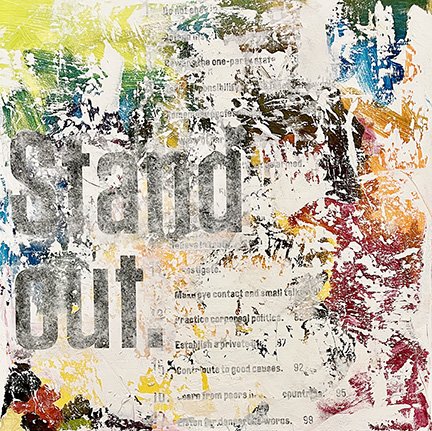In the Face of Fear, I Create — and Stand Out
/We are living in uncertain and challenging times, the likes of which I never imagined.
As the daughter of a man who fled Eurore as the Nazi's invaded his beloved France, and — with his parents and brother — courageouly overcame many perils to reach the United States and create a brilliant life, I feel this moment in the history of our country very personally.
On many days these last months I have felt rocky, distracted, distressed. It has often been a challenge to focus on doing the work I love and am committed to, to look ahead with optimism, and to lead as I feel called to do.
The vision I am commited to more than ever
I am here to activate the creative power that is inside of all of us — so that people everywhere can ignite that power and harness it to fuel their ability to live the bold fulfilling life they deeply desire.
I believe that the more of us who are able to show up fully and bring our unique gifts into the world with our whole hearts, the faster we will build a better world.
How I am navigating the current landscape
I have turned to what I know — and advocate for, and teach — to be a reliable way to keep grounded and to process emotions that sometimes feel overwhelming.
I have been creating.
I have devoted more time to painting in my studio, as well as to writing.
I use my emotions as fuel, and find that each time I dive in and express myself on a canvas I feel release and satisfaction — and I feel powerful.
I have just started to create a series of paintings inspired by the book, On Tyranny, Twenty Lessons from the Twentieth Century, by Timothy Snyder.
I have been turning to this small book often these last months, and am amplifying some of the inspiring ideas in its chapters.
I have rarely shared my paintings these last years, as I have been building my skills and finding my voice as an abstract painter.
And today I feel the urge to share my latest painting — even as I am not sure it is finished, or what I may do next with it.
“Stand out” is the title of a chapter in On Tyranny that resonates deeply for me.
It invites us to do or say something different, and that without the willingness to feel the unease of speaking up or taking action to stand out, there is no freedom.
Professor Snyder states that when we set an example, others will follow.
And so I am bravely standing out here.
I am sharing in a way that feels quite vulnerable, encouraging myself to do so knowing I might inspire you to stand out — in any way that you are able or feel called to do.
You may not paint a canvas. You may not publish something you write. Find a way to express yourself that is meaningful and works for you.
I do invite you to share what you create, or express yourself visibly, in some way. Stand out and inspire — even if you do it with just one person.
It is an important act, that can help to build a better future.




